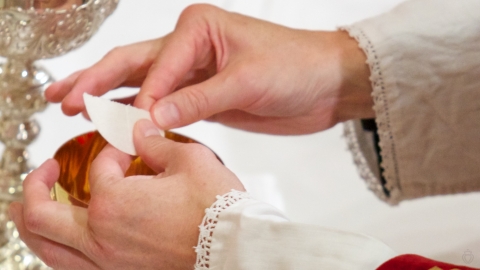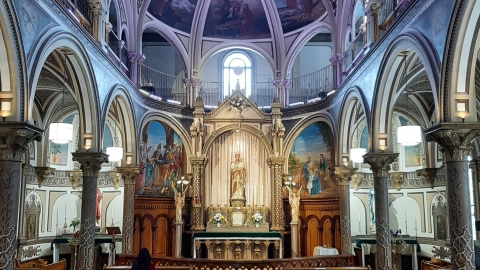The Archbishop and Anti-Liberalism: Church and State
One of the errors afflicting the Catholic Church today is a distorted view of the proper relationship between Church and State. In a misguided attempt to protect the Church’s freedom (libertas ecclesiae), Catholic leaders have embraced liberal “separationism.”
The Archbishop on Church and State
Although numerous writings and talks delivered by Archbishop Marcel Lefebvre touch on the relationship between Church and State, a succinct summary of his views can be found in the book Against the Heresies (AH) (Angelus Press). In lecturing on Pope Pius IX’s Syllabus Errorum, the Archbishop condemned what he calls “the error of separation.” Here is an excerpt (AH, pgs. 231-32):
Governments have received authority not only to direct political, economic and material affairs, but also to help people on the spiritual plane and consequently, to help the Church. Evidently they must help the Church accomplish her work, and give her all possible means to do so. This is why the Church has always signed concordats, a, for example, with Franco; it included the right of the head of State to veto certain episcopal nominations. If this practice were truly bad, Pius XII would not have said that the concordat signed with Spain was one of the best. It is normal that there should be perfect accord between the Church and the State. When the head of a Catholic State is Catholic, for the good of the Church and his people, he may feel obliged to object to the nomination of certain bishops; he has a right not to let revolutionaries be picked.
These words may ring strange to contemporary ears, but they are perfectly sensible in light of the fact they were delivered at a time when certain religious, priests, and even bishops in the Church thought it was their duty to aid and abet revolutionary movements throughout the world. (Indeed, these words were spoken at a time when an even greater number of religious, priests, and bishops were inaugurating a revolution in the Church!)
This is not to say that Lefebvre believed that the Church should be subordinate to the State. He notes, for instance, that the Syllabus, in propositions 50 and 51, rejects the overreach of civil authorities into the life of the Church. The Syllabus goes on to condemn, however, the following proposition: “The Church ought to be separated from the State, and the State from the Church.”
Invoking Liberalism to Combat Caesarism
Although the Archbishop recognized the need to balance between the need for the State to protect itself from revolutionary forces and the right of the Church to be free from State control, he found that “[t]he question on the relation between Church and State is falsified by progressive tendencies[.]” That is, a belief had taken root in the Church that in order to be protected from “Caesarism” (State dominance over the Church), it must accept the liberal idea of the absolute separation of Church and State.
This embrace of liberalism, according to the Archbishop, ignored important realities of the Church’s concrete relationship to particular regimes during the 20th Century. It was incorrect, for instance, for churchmen to equivocate between communist control of the Catholic Church in countries such as China, Hungary, and Czechoslovakia and Church/State relations in Salazar’s Portugal or Franco’s Spain. In the latter context, the civil leaders worked to promote the Catholic Church, not use it as a puppet to promote a false ideology such as communism.
The dark irony of the Church’s embrace of “separationism,” according to Lefebvre, was that it too often resulted in the ecclesiastical authorities capitulating to the desires of communist leaders while abandoning those, like Salazar and Franco, who wished to see the Catholic Church flourish. While authentic Catholic political leadership is sorely lacking in the world today, the Church hierarchy’s sanguine attitude toward communist and other anti-Christian regimes is still on full display with respect to China.



